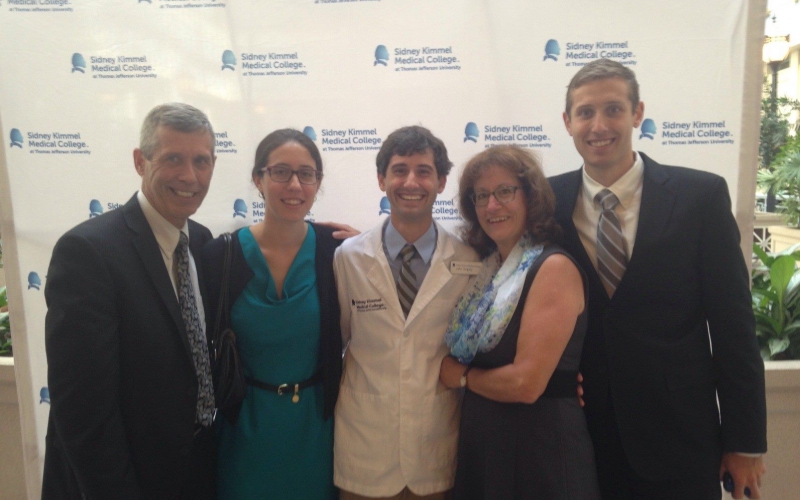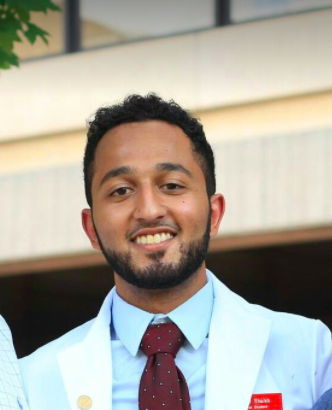
Pictured: John Szigety (middle) and family
by Adam Paris, ALSF
John Szigety was diagnosed at age 10 with Hodgkin lymphoma and underwent treatment at Memorial Sloan Kettering Hospital and Hackensack University Medical Center. After eight months of treatment, he suffered a relapse in early 2006, but completed treatment that June. Today, he is 11 years cancer-free.
Amjad Shaikh was diagnosed just before his 9th birthday with leukemia and went through his entire treatment schedule at Children’s Hospital of Philadelphia (CHOP) for four years, before entering remission. Today, he is cancer-free. 
Both are childhood cancer survivors and medical school students who participated in Alex’s Lemonade Stand Foundation’s (ALSF) Pediatric Oncology Student Training (POST) grant program this past summer. They each felt the immense pride of being able to give back and help kids fight for their lives just like they did. They talked about the experience of beating cancer as kids and now, as researchers, searching for a cure.
Can you describe your work this summer as a POST student?
John Szigety (JS): I was looking at the effect of a drug on tumor progression and cell replication. The doctor I worked with at CHOP, Dr. Sarah Tasian, was investigating how to treat cancers with a specific mutation that makes the disease especially aggressive.
Amjad Shaikh (AS): I looked at CHOP and found an opportunity to study pediatric leukemia. I worked on studying mortalities associated with hospital characteristics and what a hospital can do to improve treatments or survival rates in kids fighting the same kind of cancer that I did.
Pictured: Amjad Shaikh
What was most meaningful about this experience?
JS: It was meaningful to see the different roles that a pediatric oncologist plays. As a patient, I only saw my oncologist, Dr. Steven Halpern, as a clinician. Dr. Tasian showed me how big of a role research plays in her life as a physician. That was new information to me.
AS: Part of it was that I got to see a lot of pediatric patients. The fact that I was on the other side and I understood from a clinical and medical level what was going on, I felt that maybe given a couple years I could be the person who was helping them out.
Was there a particular individual who inspired you to pursue pediatric oncology?
JS: Dr. Halpern. When I was feeling miserable or having a bad day, he was receptive to me about how to change my regimen to make it more manageable. He would stop in my room during treatment to say hello or play board games. The cliché is that he treated me like a person and not an illness, but it's true. He's a big reason why I want to go into this field.
AS: My oncologist, Dr. Stephen Grupp. A few years after treatment, he told me he had been diagnosed with cancer and was undergoing treatment. It was a bit shocking because I had never seen an adult go through chemo. It left an impression that despite the fact he was going through chemo, and knowing what that was like, he still came in and treated kids. That meant a lot to me. It guided my philosophy in med school and framed my outlook for how a doctor should be.
What did this POST opportunity and the chance to help other kids fight cancer mean to you?
JS: It was an honor. Since my diagnosis, I have wanted to help children affected by cancer. I've worked at Camp Kesem (summer camps hosted for kids whose parents have cancer), fundraised for various charities and pursued an education that brought me to medical school. The POST grant helped me contribute in another important way by investigating potential new treatments. While I didn't cure cancer or even come close, I am proud to say that I helped.
AS: It meant the world. Seeing Dr. Grupp and the team of physicians at CHOP, that’s my vision for the kind of doctor I’d like to be.
As someone who survived childhood cancer, what does ALSF represent to you?
JS: In a word, ALSF represents hope. By supporting research across the country, ALSF represents the future of medical treatments and all the advances that are yet to come.
AS: I think it’s a great organization for helping to develop a new generation of physicians and researchers who are going to continue these advancements.
What are your goals and aspirations going forward?
JS: My goals are to become a pediatric oncologist and help treat children who have to fight for their lives. As a survivor, I have an understanding of how these pediatric cancer patients feel and I hope to help my future patients through the frightening and overwhelming experience of battling cancer.
AS: Especially after this summer I’m definitely set on a career in oncology. I’m not 100% sure how I want to go about it, since I'm still exploring all the specialties, but pediatric oncology is at the top of my list.
Each year, ALSF provides grants opportunities to medical students through the POST grant program. Read more about our POST grants here.

